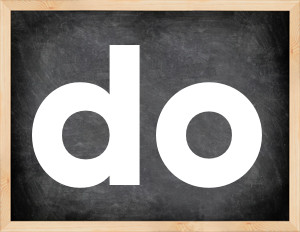 The English verb 'do' is pronounced as [du:].
The English verb 'do' is pronounced as [du:].
Related to:
irregular verbs.
3 forms of verb do: Infinitive (do), Past Simple - (did), Past Participle - (done).
Here are the past tense forms of the verb do
👉 Forms of verb do in future and past simple and past participle.
❓ What is the past tense of do.
Do: Past, Present, and Participle Forms
| Base Form | Past Simple | Past Participle |
|---|---|---|
| do [du:] |
did [dɪd] |
done [dʌn] |
What are the 2nd and 3rd forms of the verb do?
🎓 What are the past simple, future simple, present perfect, past perfect, and future perfect forms of the base form (infinitive) 'do'?
Learn the three forms of the English verb 'do'
- the first form (V1) is 'do' used in present simple and future simple tenses.
- the second form (V2) is 'did' used in past simple tense.
- the third form (V3) is 'done' used in present perfect and past perfect tenses.
What are the past tense and past participle of do?
The past tense and past participle of do are: do in past simple is did, and past participle is done.
What is the past tense of do?
The past tense of the verb "do" is "did", and the past participle is "done".
Verb Tenses
Past simple — do in past simple did
(V2).
Future simple — do in future simple is do (will + V1).
Present Perfect — do in present perfect tense is
done
(have/has + V3).
Past Perfect — do in past perfect tense is
done
(had + V3).
do regular or irregular verb?
👉 Is 'do' a regular or irregular verb? The verb 'do' is irregular verb.
Examples of Verb do in Sentences
- To do what I do, I need intel (Present Simple)
- I have no idea what I am doing (Present Continuous)
- Someone has called into the station and told the general about everything you have been doing (Present Perfect Continuous)
- I know you did it, Bridget (Past Simple)
- I will do whatever I can (Future Simple)
- He will do whatever I require (Future Simple)
- You know now what I have done (Present Perfect)
- You have no idea what I have done (Present Perfect)
- Perhaps someone wanted revenge for the things he had done (Past Perfect)
- But think what we will have done, Wilson (Future Perfect)
Правила do/does в английском языке
DOES или DO: правило грамотного выбора
В английской речи глаголы do и does встречаются буквально на каждом шагу. Давайте посмотрим, когда употребляются do/does и чем они вообще отличаются друг от друга. И do, и does переводятся как «делать». Более того, does — это всего лишь другая форма глагола do.
Употребление do/does зависит о того, о ком или о чем идет речь. Если мы говорим о третьем лице единственного числа (he/she/it — он/она/оно), то к do, как и к любому другому глаголу, добавляется окончание -es. Таким образом, говоря о ком-то/чем-то в третьем лице, используем does. Во всех остальных лицах употребляется do.
Как сделать вопрос — Did
Вопрос в Past Simple образуется с помощью Did. Рассмотрим его образование.
- Поставьте на первое место Did (если вопрос начинается с Where/When и т.д., то did ставим после них);
- Потом I/we/you/they/he/she/it или существительное в единственном или во множественном числе;
- Глагол;
- Остальные слова.
В вопросительных предложениях формы глагола to be ставятся перед местоимением(-ями) или существительным(-ми).
- Was ставится перед I/he/she/it или перед существительным в единственном числе;
- Were ставится перед we/you/they или перед существительным(-ми) во множественном числе.